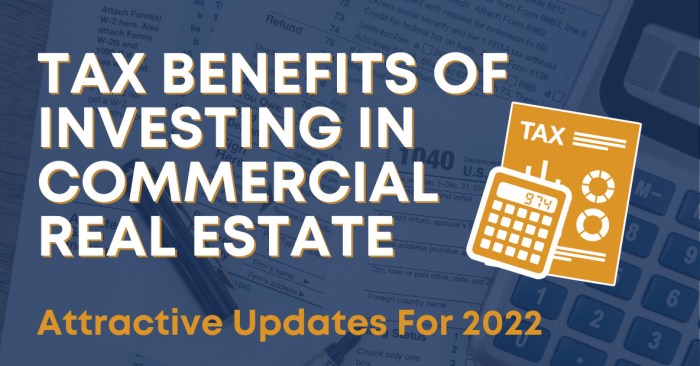Unlocking the Tax Benefits of Investing in Commercial Buildings
Exploring the realm of tax benefits associated with investing in commercial buildings, this introduction sets the stage for a comprehensive discussion that sheds light on the advantages and nuances of this investment avenue.
As we delve deeper into the intricacies of tax benefits in commercial real estate, we will uncover key insights that can shape investment decisions and financial strategies.
Benefits of Investing in Commercial Buildings

Investing in commercial buildings comes with various tax benefits that can significantly impact the overall return on investment. Let's explore the advantages of investing in commercial properties compared to residential ones.
Tax Benefits of Commercial Properties
- Depreciation Deductions: Commercial buildings can be depreciated over a longer period compared to residential properties, allowing for larger tax deductions.
- Interest Deductions: Interest on loans taken to finance the purchase or improvement of commercial properties is tax-deductible, reducing taxable income.
- Cost Recovery: Costs related to repairs, maintenance, and upgrades on commercial buildings can be deducted as business expenses, lowering tax liability.
- 1031 Exchange: Investors can defer capital gains taxes by reinvesting proceeds from the sale of a commercial property into another like-kind property through a 1031 exchange.
Comparison with Residential Properties
- Depreciation Schedule: Commercial buildings typically have a longer depreciation schedule than residential properties, resulting in higher tax deductions.
- Tax Rates: Tax rates for commercial properties may differ from residential properties, impacting the tax liability for investors.
- Eligible Deductions: Commercial properties may offer more opportunities for tax-deductible expenses compared to residential properties.
Impact on ROI
- Higher Returns: The tax benefits associated with investing in commercial buildings can enhance the overall return on investment, providing investors with increased cash flow.
- Strategic Tax Planning: Proper utilization of tax benefits can improve the financial performance of commercial real estate assets, maximizing profitability.
- Long-Term Wealth Building: By leveraging tax advantages, investors can build long-term wealth through appreciation and tax-efficient strategies in commercial real estate.
Types of Tax Benefits
Investing in commercial buildings can provide various tax benefits for property owners. One of the key advantages is the ability to take advantage of different tax deductions and incentives to reduce taxable income.
Depreciation Allowances
Depreciation allowances are a common tax benefit for commercial property owners. This tax deduction allows investors to recover the cost of their property over time through annual depreciation deductions. By spreading out the cost of the property over its useful life, investors can reduce their taxable income each year.
For example, a commercial building purchased for $1 million with a 27.5-year depreciation period can provide an annual depreciation deduction of approximately $36,364.
Cost Segregation Studies
Cost segregation studies involve identifying and reclassifying certain building components to accelerate depreciation deductions. By separating personal property from real property, investors can depreciate assets over shorter periods, increasing tax deductions in the earlier years of ownership. This strategy can significantly maximize tax benefits for commercial real estate investors, allowing them to reduce taxable income and improve cash flow.
For instance, assets like carpets, lighting fixtures, and landscaping can be reclassified for faster depreciation, resulting in higher tax savings.
Tax Incentives and Credits

When it comes to investing in commercial buildings, there are various tax incentives and credits offered by governments to encourage such investments. These incentives can help investors save money and maximize their returns on investment.
Historic Preservation Tax Credits
Historic preservation tax credits are one type of tax incentive available for commercial properties. These credits are aimed at encouraging the preservation and rehabilitation of historic buildings. Investors who undertake qualified rehabilitation projects on historic properties may be eligible for these tax credits.
The amount of the credit typically ranges from 10% to 20% of the qualified rehabilitation expenses.
Opportunity Zones
Opportunity Zones are designated economically distressed areas where investors can receive tax benefits for investing in commercial properties. By investing in these zones, investors can defer or even eliminate capital gains taxes. This initiative aims to spur economic development in struggling communities by providing tax incentives to investors who support projects in these areas.
Strategies to Maximize Tax Benefits
Investors can employ various strategies to maximize tax benefits when investing in commercial real estate. One crucial aspect to consider is the proper structuring of entities for tax efficiency in commercial property investments. Additionally, utilizing 1031 exchanges can help defer capital gains taxes when transitioning from one commercial property to another.
Proper Entity Structuring
Proper entity structuring is essential for tax efficiency in commercial property investments. By setting up entities such as Limited Liability Companies (LLCs) or Limited Partnerships (LPs), investors can take advantage of pass-through taxation, which allows profits and losses to flow through to the individual's tax return.
This can result in lower tax liabilities and increased cash flow for investors.
1031 Exchanges
A 1031 exchange, also known as a like-kind exchange, allows investors to defer capital gains taxes when selling a commercial property and reinvesting the proceeds into another similar property. By following the strict guidelines set forth by the Internal Revenue Service (IRS), investors can defer paying taxes on the capital gains from the sale, allowing them to reinvest the entire amount into a new property.
This strategy can help investors grow their real estate portfolio without being burdened by immediate tax obligations.
Last Word
In conclusion, the tax benefits of investing in commercial buildings present a lucrative opportunity for investors seeking to optimize their returns while minimizing tax liabilities. By strategically leveraging these benefits, investors can navigate the complexities of the tax landscape and enhance the profitability of their commercial real estate ventures.
Key Questions Answered
What are the tax advantages of investing in commercial properties?
Investing in commercial properties offers tax benefits such as depreciation deductions, cost segregation studies, and potential tax incentives.
How do Opportunity Zones provide tax benefits for investors?
Opportunity Zones offer tax incentives like deferred capital gains and exemptions on new investments in economically distressed areas designated for development.
Why is proper entity structuring important for tax efficiency in commercial property investments?
Proper entity structuring can help investors optimize tax benefits, protect assets, and ensure compliance with tax regulations, enhancing overall financial performance.



